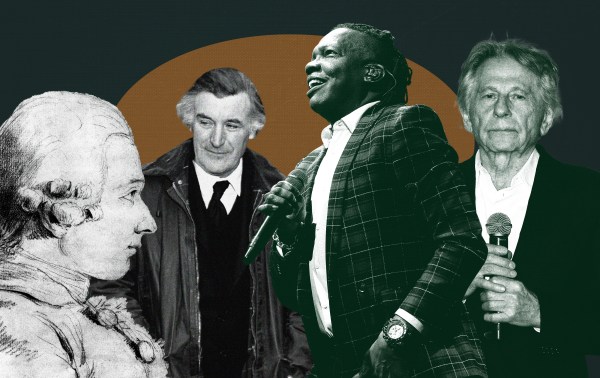In 1972, alien invaders conquered rock and roll. Armed with gender-bending theatrics and raucous guitar riffs, the likes of David Bowie and Marc Bolan invented otherworldly characters, uprooted musical conventions, and inspired a generation of adolescents to follow in their footsteps. But while Bowie looked to an apocalyptic future and Bolan sought liberation in the present, their contemporaries in Roxy Music fused disparate styles of the past into a curious melange. Blending the sophistication of black-and-white cinema with the kitsch of Pop Art and the decadence of fin-de-siècle Europe, Roxy cultivated an aesthetic too heady to be ignored. Now that the band has embarked on an arena tour of the United States and United Kingdom in support of its 50th anniversary, its allure clearly endures.
If coolness could be distilled into an individual, it would resemble Bryan Ferry, Roxy’s debonair frontman who was seemingly born in a finely tailored suit. Blessed with a rich head of hair and a seductively dynamic croon, he danced breezily before his microphone on stage, warbling lyrics that expressed the frenetic energy of youth—“Learn from your mistakes is my only advice, and stay cool is still the main rule. Don’t play yourself for a fool. Too much cheesecake too soon”—and the travails of romance as if they were plucked from some postmodern alternative to the Great American Songbook—“If you’re looking for love in a looking glass world, it’s pretty hard to find.”
Beside him in performance stood a quintet of esoteric musicians, glammed up in sequins, feathers, and garish jackets with dyed manes hanging to their shoulders. On guitar, Phil Manzanera, whose searing solos catapulted songs like “Virginia Plain” and “The Thrill of It All” to a higher plane of art school exuberance. On bass, Graham Simpson initially, then a succession of replacements. Saxophonist Andy Mackay provided wailing solos and tenderly melodic riffs with equal finesse, while Paul Thompson’s drumming, wild and untrammeled, evoked the frantic style that defined the pioneering rock and roll records of the 1950s. Brian Eno’s manipulation of synthesizers produced warped blasts and prolonged, rubbery contortions of sound, embellishing the group’s early material with a space age sheen. From the first verse of “Re-Make/Re-Model,” the opening track on the band’s eponymous debut, these elements worked in harmony to create both a new, glitzy variant of pop music and a pastiche of its past, which grew darker and more elaborate on the following record, For Your Pleasure (1973).
After Eno’s exit from the band that year, the remaining members pursued more exotic soundscapes. Country Life (1974) featured a rustic sound characterized by honky-tonk piano and blues-rooted hooks, while Stranded (1973) merged strident hard rock with elements of the surreal and baroque. By the release of Siren (1975) and Manifesto (1979), the band’s sound had concomitantly darkened and grown brighter. A desire for hit singles and success in the United States pushed Ferry to pen more commercially palatable songs such as “Love Is the Drug” and “Dance Away,” leading his bandmates in a cleaner and less caustic musical direction. This drift toward a kind of delicate, sensuous lounge aesthetic culminated on the cocaine-laced Avalon (1982), which found Ferry, Mackay, and Manzanera operating as a trio following Thompson’s departure. The album is almost antipodal to the band’s debut, with its fragile instrumentation consisting of sparse electronic rhythms and restrained guitar patterns. Ferry’s lyrics, once boisterous, had become wistful, concerned more with the sting of unrequited love than the joys of partying—“Now you’re on your own, who cares about you? Except me, God help me.” Even the band’s album covers, which once featured increasingly risqué pictures of female models, had become dignified and pensive, with Avalon depicting a figure in armor gazing out across a vast landscape. With time, Ferry’s elegance had increased, and the brash boys who performed by his side in the early ‘70s had evolved into suave purveyors of sophisti-pop.
Such a change may have repelled some listeners, but viewed in retrospect, it illustrates the breadth of the band’s creativity. Roxy Music’s catalog is satisfyingly lean, devoid of artistically vacant records and permeated by thrilling, varied, and emotionally resonant songs. A sampling of these anthems constitutes the setlist for the band’s current tour, which is nearing the end of its trek across America. In concert today, Ferry’s voice has faded somewhat, and Manzanera, Mackay, and Thompson naturally seem less assured on their feet. But age has failed to diminish the power of their material or the enthusiasm that animates it, and the same will hold true long after this last celebration reaches its end. Just as Roxy laid the foundation for the gaudy New Romanticism and languid yacht pop of the 1980s, perhaps its ingenuity is currently inspiring another great musical trend that time will reveal. After all, now and forever, as in 1972 or 1982, boys will be boys.






Please note that we at The Dispatch hold ourselves, our work, and our commenters to a higher standard than other places on the internet. We welcome comments that foster genuine debate or discussion—including comments critical of us or our work—but responses that include ad hominem attacks on fellow Dispatch members or are intended to stoke fear and anger may be moderated.
With your membership, you only have the ability to comment on The Morning Dispatch articles. Consider upgrading to join the conversation everywhere.